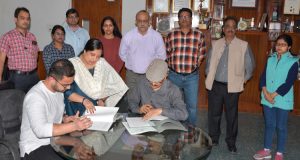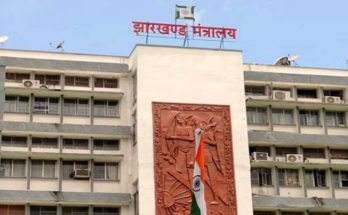 RNS: Recyclib Pvt. Ltd., Delhi signed an MoU with CSIR-NML for recycling technology of e-waste. MoU has been made for technology transfer of recycling of lithium ion batteries (LIBs) to recover metal/salts of Li, Co, Mn, Ni, Cu, Al, graphite and saleable plastics.
RNS: Recyclib Pvt. Ltd., Delhi signed an MoU with CSIR-NML for recycling technology of e-waste. MoU has been made for technology transfer of recycling of lithium ion batteries (LIBs) to recover metal/salts of Li, Co, Mn, Ni, Cu, Al, graphite and saleable plastics.
Technological Know-How is a closed-loop design to recover Li, Co, Mn, Ni, Cu, Al, plastics and graphite from black cathodic material of spent LIBs. Developed hydrometallurgical process flow-sheet to recover Li, Co, Mn, Cu, Ni as metals/salts and graphite from spent LIBs will be fine tuned by the samples supplied by the PARTY. The party will commercialize the technology as per the transferred Know-How of CSIR-NML.
It is well known in past, CSIR-NML has transferred a number of technologies to a national and international industries and research organisations. M/s Recyclib Pvt. Ltd., Delhi will process the LIBs and extract the non-ferrous metals viz. Li, Co, Mn, Cu, Al, Ni, etc. and a part of that they will recycle all the materials present in it based on zero waste concepts.
On this auspicious occasion, Dr. Indranil Chattoraj, Director CSIR-NML, Dr. Manis Kumar Jha, Project Leader, e-waste recycling activities, Dr. Sanjay Kumar, Head MER, and a group of researchers Dr. Pankaj Kumar Choubey, Dr. Rekha Panda, Om Shankar Dinkar, Rukshana Parween and from the RPBD side, Dr. S. K. Pal, Head, RPBD and Dr. Beena Kumari were altogether present. Dr. P.N. Mishra actively participated to bridge the NML with the media for advertisement and dissemination of e-waste recycling technology in the society.
Mohit Garg, Director, M/s Recyclib Pvt. Ltd. Company, Delhi has entered into a technology transfer MoU with CSIR-NML, Jamshedpur considering the importance of LIBs recycling in the present scenario. The recovered metals will fulfill the demand-supply gap of Li, Co, Mn, Ni, Cu, etc. Statement of Mohit Garg, “I’m very happy to be a part of CSIR-NML by taking the LIBs recycling technology to serve the nation by making pollution free society as well as conserve the natural resources for generations to come”.
Director NML Dr. Indranil Chattoraj states, “In recent past NML has transferred a number of indigenous technology to Indian company and hope in future we can transfer more to make India as e-waste free society”.
On this occasion, Dr. Sanjay Kumar, Head MER division expressed his happiness and said, “NML will transfer more technologies in near future”.
E-waste: waste to wealth
The electronic revolution has made our life luxurious and comfortable. Employment opportunities have increased along with the expansion of communication system through various electronic inventions and also encourage business activities. The generation of electronic waste at their end of life has given rise to a new environmental problem.
“E-waste” refers to the electronic waste, which are not suitable for the purpose of their use. Therefore, countries like India are worried about the increasing import of such e-waste due to developing countries being considered as the safest dumping ground. Due to the fast growing electronic revolution in the countries of the world, the dependence of the common people on this side is increasing. India is one of the major producer of “e-waste” that is becoming a threat to the environment and a source of serious health diseases. Mobile phones, laptops, televisions, photo-copiers, fax machines, calculators and the e-waste of old computers that have become waste are coming out as a major issues such as, soil pollution, water and air pollution and many serious diseases. According to an estimate, more than 400 million mobile phones are being generated in India. Companies that manage e-waste believe that a mobile phone can be recycled up to 79%.
Disposal of e-waste is largely carried out by the informal sector in an unorganized manner. According to an estimate, about 25 thousand people are running e-waste disposal units in unorganized sector which adversely affects the health of people working. In view of such situation, the recycling of e-waste has gained much importance. By 2030, 18.5 million tons of e-waste will be produced in India alone.
Challenges related to waste lithium ion battery (LIBs)
The use of mobile phones in India is increasing continuously, which is giving rise to a big problem in the form of e-waste. Most of these devices have a lithium ion battery which is no longer working after a certain time and takes the form of e-waste. Its uncontrolled management and production in large numbers is causing great harm to the environment.
Recycling mobile phone batteries can produce metals such as Co, Li, Cu, Mn and Ni, without having adverse effect on the environment and other living beings.
The technology for recycling mobile batteries has been developed by CSIR-NML scientists under the CSIR, Government of India sponsored FTC (Fast Track Commercialization) project mission.
Job opportunity by recycling of e-waste
By the year 2025, about 5 lakhs jobs will be created in India in the field of e-waste. The International Finance Corporation (IFS), a development finance institution focused on the private sector in emerging markets, has approved this estimate.
According to the IFC, 450,000 direct jobs will be created by 2025 in the entire chain-collection, aggregation, disposal and recycling of electronic waste. Apart from this, indirect employment will also be created in thousands. Also, there is a possibility of generating 180,000 jobs in the related fields like transport and manufacturing.



